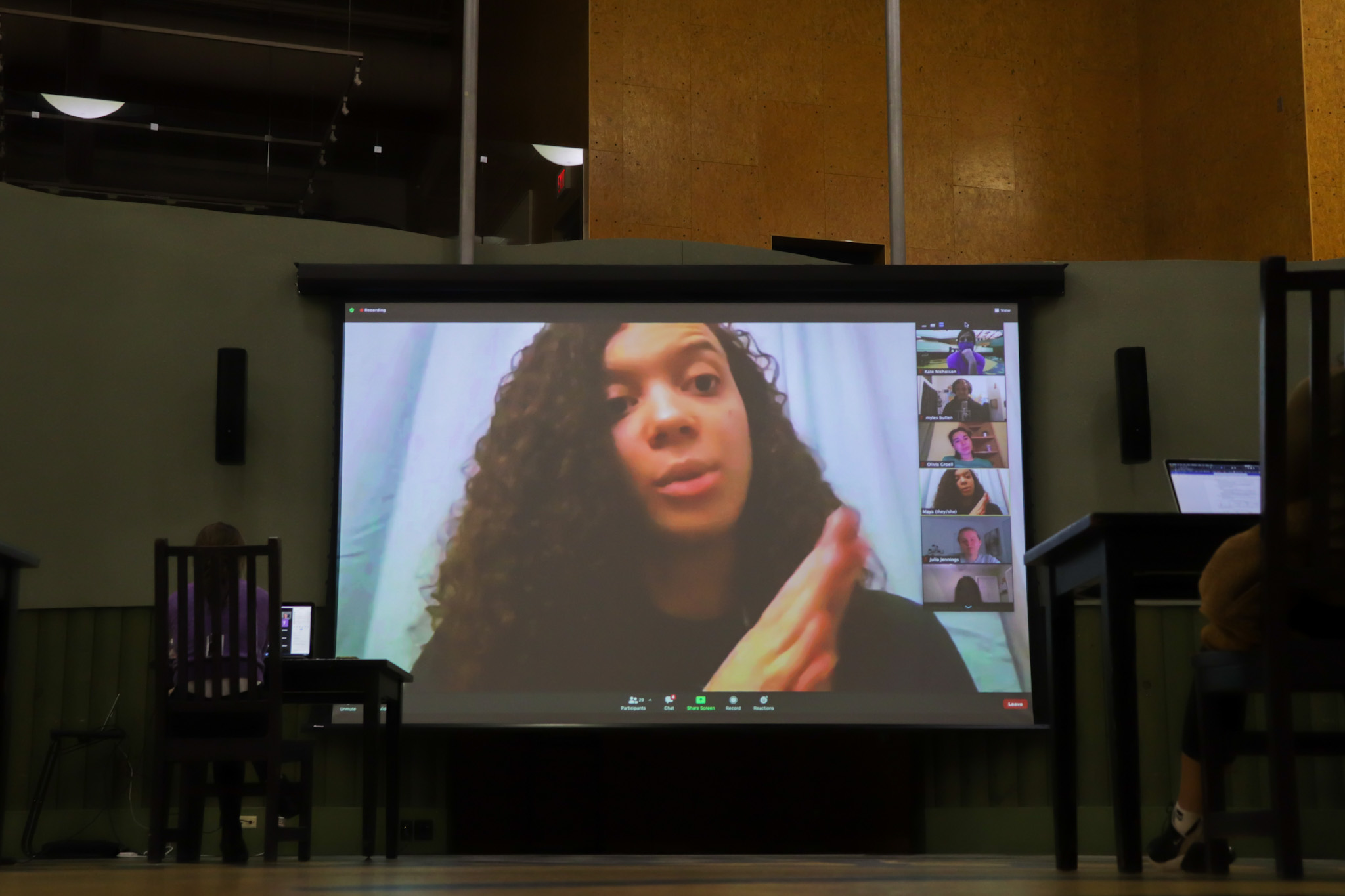Portland-based artists Maya Williams and Myles Bullen share messages of hope and healing
November 13, 2020
 Caleb Adams-Hull
Caleb Adams-HullIn the COVID-19 era, art looks and sounds different. Vibrant coffee houses have fallen silent, open mics are now closed and the murmur of a live audience has been reduced to quiet clapping and small hands snapping in the corner of a Zoom screen. Despite these changes, Portland-based artists Maya Williams and Myles Bullen believe that art, even in times of difficulty, persists and creates room for much-needed healing.
As a joint project by the Sexuality, Women and Gender Center, the Bowdoin chapter of Active Minds and Counseling and Wellness Services, Williams and Bullen were welcomed to a virtual gathering of the Bowdoin community, titled “Evening of Rap & Poetry: raw, creative expression into mental health.”
Williams, a non-binary, Black, mixed-race suicide survivor, works in slam poetry and spoken word. Their work explores the intersections of race, religion, queer identity and suicide. Bullen, an Indigenous Art Poet and rap artist, creates work that examines mental health, addiction and recovery while advocating for social justice. Both artists have led workshops and hosted open mic nights as well as touring and sharing their work in prisons, schools and recovery centers.
“Usually, in media … you don’t really see good representation of [struggles with] mental health,” Active Minds co-leader Ridhika Tripathee ’22 said in a Zoom interview with the Orient. “So having someone who’s experienced that speak about their struggles [and] their experiences—it’s just really beneficial, the feeling that you’re supported, that you’re not alone.”
Williams and Bullen kicked the evening off with an experimental joint piece: a study on empty airports as a reflection of humanity in the time of the pandemic. The Zoom screen fell silent as assembled students and staff members bobbed their heads, snapped and swayed to the rhythm of the poetry.
“I remember airports like haunted houses, as hollow tall ceilings, dead space, sterilized but still dirty, rows of seats and the smell of cheap coffee and cigars. Clashing sounds echoing off walls like trapped ghosts. Having multilingual conversations at large empty carpet spaces near the windows where no one goes.” Bullen read from his work.
In the period that followed, Williams and Bullen each took a turn performing their individual work and explaining their creative processes and personal journeys in artmaking.
“[Spoken word] has helped me come to a place to actually release myself,” said Williams. “It’s more vulnerable to act as yourself rather than as a character, right?”
Bullen included a freestyle section in his performance, in which he invited the audience to share two things in the Zoom chat: first, something that has brought them joy this week, and second, something that they have struggled with. As words and phrases from participants rolled in, Bullen spun them into a joyful and painful rap acknowledgement of human life.
“Everything in my music is pretty uncomfortable, so I just want to say that now,” Bullen warned. “Trigger warning in every song. One of my favorite poets, his name is Billy Woods. And he says trigger warning in every song; you won’t feel it unless it hurts.”
While the artists performed, students engaged in discussion in the Zoom chat, sharing lines that stood out to them and reflecting on their feelings in response to the artists’ work. Many thanked Bullen and Williams for their work and their honesty.
“People talk about artists like that being really brave—I think that the word brave is really thrown around a lot, but they were. They were very brave to be so honest and be so frank about their stories,” attendee Chris Ritter ’21 said in a Zoom interview with the Orient. “Just to see people doing that, I think, makes the idea of myself doing that a little less scary.”
A brief question-and-answer session followed the performances, during which students engaged with the artists about their inspiration, difficulties and joys. Overall, the two emphasized the importance of art as something that is painful and messy, but ultimately healing.
“Especially as I began to perform more and publish more, I had to get rid of that urge around submitting for publication. It’s okay to sometimes have these poems just for me and for my healing, because, yes, sharing poems for me has been incredibly healing. Especially connecting to people like all of you, it’s a consistent reminder to us of how less alone we actually are.” Williams said. “But sometimes [your art] is very much selfish, and you’re allowed to be selfish.”
As the performance ended and Zoom participants began to leave, Williams and Bullen encouraged the audience to reach out to them and to continue to engage in their work and in their conversation. Some students briefly spoke with Williams and Bullen before they left. Many voiced an appreciation for the sense of healing communicated through the work and shared over the course of the evening.
“After the performance, I just felt more at peace. I didn’t [realize] I needed the performance until after I left,” Tripathee said. “It was really nice—just being surrounded by authentic art, and just having a fresh conversation about mental health.”

Comments
Before submitting a comment, please review our comment policy. Some key points from the policy: